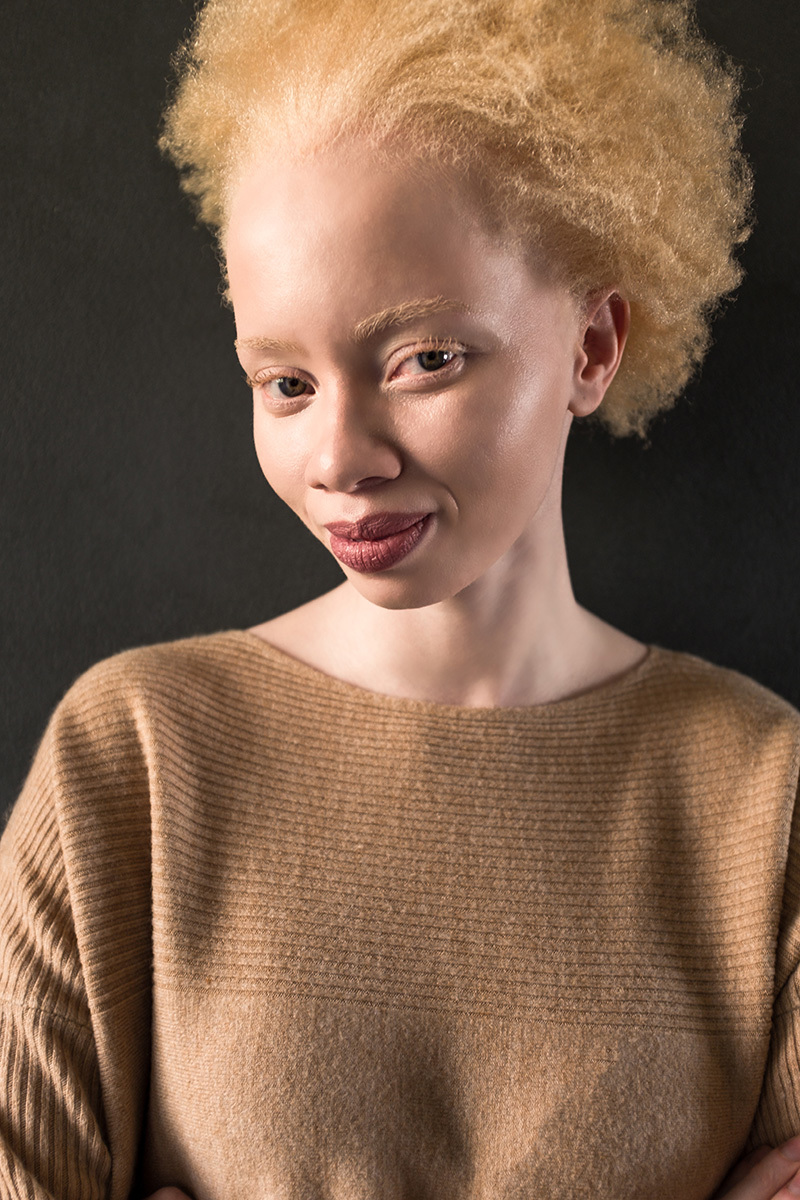As a child growing up in Johannesburg with albinism, Thando Hopa didn’t have it easy. She was bullied and regarded with suspicion. Even if she didn’t think it could get worse it did — as she suffered from severe acne too. Of course, all she longed for was to be pretty and normal, yet she could never imagine looking any different to the way she was. For Thando, it wasn’t just about looking beautiful, it was about feeling beautiful. This feeling finally occurred during her first year at university, not because of any external reasons, but because she simply decided to accept herself.
After graduating from law school, Thando started work as a prosecutor who specialised in sexual offences. Then, at 23 years old, she was scouted by a South African designer, Gert-Johan Coetzee. Using modelling as a means of challenging normative representations of beauty, Thando hopes to broaden human perception and increase social awareness when it comes to diversity. Beautiful both inside and out, here Thando shares with us her incredible story.
Read: How women’s naked selfies have become commercialised and commodified.
When was the first time you felt beautiful?
My father used to tell me I was beautiful all the time. I hardly believed him. I couldn’t understand beauty that was like mine. I can’t tell you when I actually felt beautiful but I can tell you when I decided to be beautiful. When I walked into my first year at university, I told myself that I’m going to learn how to feel beautiful. I allowed myself to accept compliments as genuine instead of assuming they’re out of pity or sarcasm. I wore clothes that made me feel bright and striking, even though I had a strange sense of fashion. I had to actively work on it. It was like me figuring myself out on the outside was me figuring myself out on the inside as well.
Have there been times when you’ve felt ugly?
About a month ago someone showed me an old school photograph. I looked at it and thought I looked adorable. But I remember how I felt at the time. I was a young girl surrounded by pigmented peers — and I also developed acne. I was in primary school and kids would tease me about my skin colour and my acne. In fact even adults pointed out my acne and I listened as they deliberated over damage-control methods. I felt like breaking out of my skin because I wanted to just be pretty and normal instead of feeling so different. But interestingly, I could never envision myself looking different from the way I was. I suppose I was looking more for a feeling than a makeover.
How has your relationship with your body and identity changed over the years?
I feel like I have to love myself anew every day. Self-love is a continuous journey. I don’t have it all figured out. Some things are fixed, like my feet, my hands, my neck and so on. Those have looked the same for a long time and they’re easy to love. Then there are variables like my skin and my weight and those changes require me to see myself anew at different times, and love this different me that might be developing. Some phases are harder than others. But I think acceptance leads to love. I moved from resenting certain things about my body, to accepting and eventually loving them dearly. It’s a process.
What does beauty mean to you?
Enoughness. Feeling like you are complete despite or especially because of your many complexities.
How can we challenge societal notions of beauty?
By presenting images that show broad representations of beauty. I remember a song that says, “I’m every woman”. That is what beauty should encompass. There isn’t a monopoly on beauty. Beauty is a celebration. Every human being should find their image represented in this celebration.
Diversity has become part of the cultural conversation in a way it’s never before, why do you think this is?
The internet is a platform for many voices to be heard and stories to be told. Media platforms used to wield the power, choosing our stories and constructing our opinions. But right now we can choose stories that resonate with us but most importantly see and hear stories that resonate with people who are different from us.
Do you worry that it is just another trend?
Perhaps. I personally don’t believe so. What we are seeing is a culmination of activists using the law, media, politics, education, protest action, art and so on to promote the acceptance of diversity. Therefore the conversation has many pillars that will not allow it to be relegated to a trend. These pillars are checks and balances of sort, when one falls short the other will point it out. I think it’ll be very difficult for it to quieten down again, unless you quieten everyone down too.
What are your hopes and dreams for the future?
On a general level, I would like to see an influx of image integration in all sorts of media platforms. That people who aren’t confined to a singular narrative just because they look a certain way.
On a personal level, I want the resilience of living a purposeful life. To grow beyond expectations and chart my own path in history of image development. I want to act in films that change perceptions, write stories that create empathy, pose for photographs that make people look and think, and above all create social awareness platforms that enforce positive change. Then I’d know that my life’s journey was useful to humanity.
Read: This drag artist is confounding perceptions of beauty with her own gender dysphoria.
Credits
Text Tish Weinstock
Image Lourens Reyneke/Shaw Media
